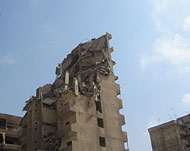Hezbollah leads reconstruction race
In Beirut’s southern suburbs, the evidence of a month of devastating Israeli airstrikes remains.

It is almost two months since the conflict ended, but the crater-lined streets of the district of Dahiya are still piled high with rubble.
Mattresses, furniture and clothing lie mixed with the debris, evidence of the thousands of lives disrupted by the war.
Reconstruction work is under way, however, and mechanical diggers scoop up mounds of dirt, wrecking balls pulverise half-demolished buildings and teams of uniformed workmen shout instructions at each other.
But the work is not being carried out by the Lebanese government or international donors – but by Hezbollah’s own reconstruction organisation, Jihad al-Binaa or “reconstruction campaign”.
Damage caused
About 6,000 people are involved in Hezbollah’s reconstruction effort across southern Lebanon, 1,000 of them engineers and many working as unpaid volunteers.
“Our government has close relations with the US that could be the reason they have not begun their work.” |
Hezbollah says about 86,000 homes were totally or partially destroyed during Israel’s bombing campaign and Qassim Aliq, the head of Jihad al-Binaa, says the organisation’s first job was to assess the scale of the damage.
“We carried out a major survey of South Lebanon in order to see who needs help and which buildings can be repaired and which need to be destroyed.”
Jihad al-Binaa also provided regular supplies of clean drinking water in south Beirut, a flagship service for the organisation and one on which they built their reputation during the Lebanese civil war.
Political battle
The group says its construction arm is a charitable organisation, but it also plays an important political role in shoring up the group’s support among the Shia community.
And now the reconstruction effort has taken centre stage in a growing political battle between Hezbollah and the government.
“The government is working too slowly – we have an emergency and it is not taking enough responsibility,” says Bilal Naim, a Hezbollah spokesman.
A recent New York Times report said more than $900 million in international aid remains untouched by Lebanon.
 |
|
Thousands of homes were |
The central government has also encouraged other countries to become directly involved in the rebuilding process, and the Gulf state of Qatar has given direct rebuilding grants to residents of the southern town of Bint Jbail.
Aliq says that the US could be pressuring the government not to move faster on its own rebuilding effort.
“We hope that they [the government] will do it, but we cannot wait for them,” he says.
“Our government has close relations with the US that could be the reason they have not begun their work.”
The Lebanese government says it is doing all it can but argues that, as one spokeswoman says, “it cannot wave a magic wand” and repair the damage.
Iranian involvement
Hezbollah founded Jihad al-Binaa in 1988 during Lebanon’s long civil war, and the organisation acted as a kind of local municipality for the Shia community in the absence of the government.
It is one of a number of “foundations” run by the group that deliver services, normally provided by governments – including healthcare and education.
Funding of such projects has been a source of controversy, and analysts have alleged that Iran plays a leading role.
Hezbollah admits Iranian involvement in some areas – providing compensation to the children of “martyrs” killed in wars with Israel and in building schools, but Aliq denies that Mahmoud Ahmadinejad’s government has aided Jihad al-Binaa.
“We don’t have any contact with them,” he says.
Jihad al-Binaa, Aliq says, is funded through religious charitable donations such as zakat and the Shia system of hummous, through which Shia distribute a percentage of their incomes.
In a Hezbollah tent on the site of a bombed building in Dahiya, where street after street of bomb-damaged apartment blocks stand like tombstones, Naim is positive about the reconstruction work, despite the challenge ahead.
“We have a four-stage programme and we think that within two or two and half years – it will be complete.”